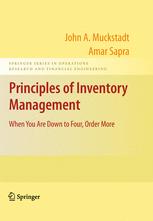

Most ebook files are in PDF format, so you can easily read them using various software such as Foxit Reader or directly on the Google Chrome browser.
Some ebook files are released by publishers in other formats such as .awz, .mobi, .epub, .fb2, etc. You may need to install specific software to read these formats on mobile/PC, such as Calibre.
Please read the tutorial at this link: https://ebookbell.com/faq
We offer FREE conversion to the popular formats you request; however, this may take some time. Therefore, right after payment, please email us, and we will try to provide the service as quickly as possible.
For some exceptional file formats or broken links (if any), please refrain from opening any disputes. Instead, email us first, and we will try to assist within a maximum of 6 hours.
EbookBell Team

4.4
92 reviewsInventories are prevalent everywhere in the commercial world, whether it be in retail stores, manufacturing facilities, government stockpile material, Federal Reserve banks, or even your own household. This textbook examines basic mathematical techniques used to sufficiently manage inventories by using various computational methods and mathematical models. Such models discussed include: EOQ model and extensions, power-of-two models, single and multi-period models, probabilistic lot sizing models, multi-echelon stochastic models, Laplace and Normal demand models, exact Poisson model, and many more.
Principles of Inventory Management begins with an introductory chapter in which the basics of inventory systems and mathematical assumptions for all models are grouped together. The text is presented in a way such that each section can be read independently, and so the order in which the reader approaches the book can be inconsequential. It contains both deterministic and stochastic models along with algorithms that can be employed to find solutions to a variety of inventory control problems.
Key topics include:
* Economic order quantity (EOQ) model
* Power-of-two policies
* Dynamic lot sizing
* Single and multi-period stochastic models
* Echelon-based approaches
* Multi-echelon systems
* Single and multi-item models
With exercises at the end of each chapter and a clear, systematic exposition, this textbook will appeal to advanced undergraduate and first-year graduate students in operations research, industrial engineering, and quantitative MBA programs. It also serves as a reference for professionals in both industry and government worlds. The prerequisite courses include introductory optimization methods, probability theory (non-measure theoretic), and stochastic processes.